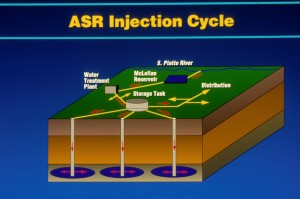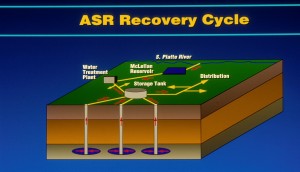By Eric Hecox
Last week I discussed the South Metro Water Supply Authority’s “all of the above” approach to solving the problems articulated in CFWE’s 2007 Citizen’s Guide to Denver Basin Groundwater. A critical part of our plan in creating a secure water future is storage. As we pursue surface water storage such as the Chatfield Reallocation Project and Reuter-Hess Reservoir, we are also pursuing the implementation of Aquifer Storage and Recovery (ASR) throughout the South Metro area.
ASR, as defined in the 2007 Citizen’s Guide, is the storage of water in a suitable aquifer through direct injection in a well when water is available and later recovery of the water from the same well when it is needed.
ASR has been successfully implemented in portions of the Denver Basin for more that 20 years. South Metro Water and several of our members are actively exploring options to broaden this practice to store renewable water during times when it is available for later use in years of drought. Some advantages of ASR compared to traditional surface storage in reservoirs include reduced infrastructure and permitting costs, lower evaporation loss and, typically, greater public acceptance.
Centennial Water and Sanitation District, serving Highlands Ranch, was one of the first providers in the state to pursue ASR, and has been successfully implementing it since 1994. They currently have 25 wells equipped for ASR and have stored more than 14,000 acre-feet, almost a year’s worth of supply for Highlands Ranch. Centennial Water continues to expand and explore ways to optimize its ASR program.

The Denver Basin aquifer system includes the Dawson, Denver, Arapahoe and Laramie Fox-Hills aquifers; the water they contain is considered a nonrenewable resource due to the slow rate of natural replenishment.
Given this success, and the fact that renewable water supplies are becoming available to the South Metro area through the WISE Project partnership, the Chatfield Reallocation and other projects, South Metro entities are in a unique position to execute local and regional ASR. ASR as part of a large-scale conjunctive use plan can help change the use of the Denver Basin aquifer system from an unsustainable base supply to secure and sustainable drought supply.
Building on Centennial Water’s success, several other South Metro entities are pursuing pilot projects within their local areas to test how ASR would work with specific renewable water supplies in specific wells within their service area. East Cherry Creek Valley Water and Sanitation District (ECCV), the Town of Castle Rock, Rangeview Metropolitan District, and Pinery Water and Wastewater District are studying and pilot-testing and have plans to incrementally expand ASR within their existing well fields.
For its part, the South Metro Water Supply Authority is conducting its own pilot ASR project, using grant money from the Colorado Water Conservation Board. The pilot, expected to begin in 2016, will evaluate the viability of injecting water from the WISE Project into the Denver Basin Aquifer through an existing well and then pumping it out as needed. This information will help members better identify how ASR with WISE water might fit into long-term plans.
 Whether implemented individually by South Metro entities or as part of a regional ASR program, there is great potential for ASR in the Denver Basin Aquifer system. South Metro Water estimates that existing well fields may have more than 100 million gallons per day (MGD) of capacity available for ASR without dramatically impacting current well field operations.
Whether implemented individually by South Metro entities or as part of a regional ASR program, there is great potential for ASR in the Denver Basin Aquifer system. South Metro Water estimates that existing well fields may have more than 100 million gallons per day (MGD) of capacity available for ASR without dramatically impacting current well field operations.
As renewable water supplies come into the South Metro area, ASR can play a significant role in creating a secure and sustainable water supply for the region.
 Read more about aquifer storage and recovery, explore some of the advantages and disadvantages of ASR compared with conventional storage, plus find out about ASR around the globe.
Read more about aquifer storage and recovery, explore some of the advantages and disadvantages of ASR compared with conventional storage, plus find out about ASR around the globe.
 Eric Hecox is the director of the South Metro Water Supply Authority, a regional water authority comprised of 14 water provider members that collectively serve more than 300,000 residents as well as businesses in the south metro Denver area. South Metro Water’s membership spans much of Douglas County and parts of Arapahoe County, including Castle Rock, Highlands Ranch, Parker and Castle Pines. Eric also serves on the board for the Colorado Foundation for Water Education.
Eric Hecox is the director of the South Metro Water Supply Authority, a regional water authority comprised of 14 water provider members that collectively serve more than 300,000 residents as well as businesses in the south metro Denver area. South Metro Water’s membership spans much of Douglas County and parts of Arapahoe County, including Castle Rock, Highlands Ranch, Parker and Castle Pines. Eric also serves on the board for the Colorado Foundation for Water Education.


 Print
Print
Reblogged this on Coyote Gulch.
This is a topic of huge importance that our downstream neighbors have been ignored for some time. In stead of using groundwater as a reservoir that does not suffer from evaporation they are been flooded out with high groundwater.
I would call on Centennial to make public their data on the effectiveness of ASR. Many communities around Centennial are interested in ASR but are unsure is that injected water really sticks around and raises the water levels. Hydrology is obviously different, but if there is tangible published data showing the effectiveness of ASR, many more communities would be quick to follow CWSD’s lead.